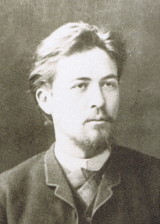 This June our Akira Kurosawa film club becomes a drama club as we read Anton Chekhov’s play A Marriage Proposal, which Kurosawa directed for stage following the release of Drunken Angel in 1948.
This June our Akira Kurosawa film club becomes a drama club as we read Anton Chekhov’s play A Marriage Proposal, which Kurosawa directed for stage following the release of Drunken Angel in 1948.
At the time of Drunken Angel‘s release, Toho studios was undergoing its third major labour strike in recent times. Unable to work, but still having to put food on the table for his wife and son, Kurosawa decided to stage Drunken Angel, with Toshiro Mifune and Takashi Shimura reprising their roles from the film. Around the same time (possibly as a joint production?), Kurosawa also staged Chekhov’s A Marriage Proposal, but very little is unfortunately known about this production. (Galbraith 98)
Chekhov’s A Marriage Proposal (Предложение, sometimes also translated as simply Proposal) is a fairly short single-act farce written in the late 1880s and first staged in 1890, which is also roughly when the picture of him that I have here was taken. Wikipedia has more information about the play.
The text is available in English for free as part of Project Gutenberg’s Plays by Anton Chekhov collection, as well as at One Act Plays. Note that in case you have an ebook reader, Gutenberg offers the text in formats including ePub and Kindle, in addition to html and plain text.
For those of you who signed up for this film club to watch things, not read them, there is at least one production available on YouTube: an Edge Ensemble Studio Showcase in two parts (part 1 and part 2).
Or, if you would rather listen to the play, you can download a reading from Librivox.
Since the play is so short, an additional theme for this month is Kurosawa’s Russian influences. So, if you have a Dostoevsky novel sitting on your desk that you have been wanting to read, there is not better time than the present! Let us know if you decide to explore Kurosawa’s relationship with Russian authors or film makers and what you find.
In July we continue with The Quiet Duel. For a full Akira Kurosawa film club schedule, see AK Online Film Club.






If this is what the proposal is like, I dread to think of what the marriage would be like.
Do we know anything about who starred in Kurosawa’s production of this?